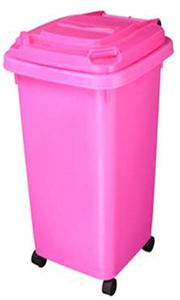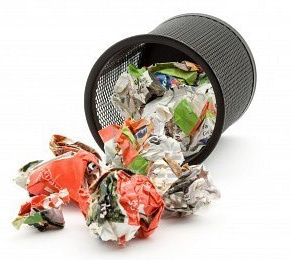The mandatory South African urban recycling programme is part of the efforts to decrease the pressure on the landfills and to integrate waste recycling into the economy
| Are you a Joburg dweller who throws everything you consider as rubbish into an ordinary bin? You may want to start changing your habits. The city authorities are gearing to make you sort out your own waste, and vaguely mention punitive measures. The Johannesburg sort-your-rubbish pilot project, organised by the waste management company Pikitup, started about two years ago and involved 35,000 households. In the pilot, the residents were asked to sort their recyclable waste, putting paper into orange bags and glass and other recyclable items in clear bags. And guess what? Not everybody was able to do it. Or, as the organisers say, the project achieved a varying degree of success. When the new waste-management bylaws come into force, probably in the second half of 2012, it is expected that Joburg will quickly learn how to tell plastic from glass from paper, because if they do not, they risk being fined. The bylaws, currently in the draft phase, are designed to meet |  | the city's obligations in line with the National Waste Strategy. This strategy envisages a mandatory urban recycling programme as a part of South Africa's efforts to decrease the pressure on the landfills and to make waste recycling an integral part of the economy. In this respect, Durban and Cape Town seem to be miles ahead of Johannesburg. Similar bylaws have been in force in Cape Town from as far back as March 2009. The Mother City is now planning to launch a new bin system as part of a three-year pilot programme. Durban has in place an orange bag system for 800,000 households in eThekwini. Each household is supplied with one pack of 15 orange bags, strictly for paper and plastic recyclable materials, to last for 13 weeks. The orange bags are collected on the same day as ordinary domestic refuse. The Durban waste management representatives say that the recycling programme helped reduce pressure on the city's three landfill sites, one of which had almost reached its capacity of about 5000 tons of waste a day. |
| ||
| A peek into a rubbish bin |  | |||
| Each person in South Africa produces between a half a kilogram and two kilograms of waste daily. This amounts to two bins per week in an urban household. An average South African rubbish bin of an urban dweller typically contains: | ||||
| ||||
| With those figures in mind, consider the following: Recycling one ton of paper saves 17 trees; Recycling 125 aluminium cans saves enough energy to power one home for one day; Recycling one glass bottle saves enough electricity to light a 100 W bulb for four hours. |
| Recycling SA-style | Recycling vs. reusing | |
According to experts, the recovery rates for various waste materials in South Africa are as follows:
Most of this material is recovered from dustbins and landfill sites by informal recyclers. A group of waste pickers in Durban recently received an UN-founded non-monetary award for entrepreneurship in sustainable development. The group earns about R10,000 a month by collecting plastic, paper and glass from landfills for recycling. |  | While recycling is more environmentally friendly than dumping things you no longer want into the rubbish bin, an even more effective way of protecting the environment is reusing. Reusing can take on different forms. An item that reaches the end of its life in one can be repurposed. For example, a glass jar can become a pen holder, a glass bottle a vase, a CD disc a scarecrow. As for the items that are still serviceable in their original state, but no longer wanted, they can be donated or sold on bobshop. Think toys your child outgrew, clothes you no longer wear, last year's tech gadgets. The list is endless. |